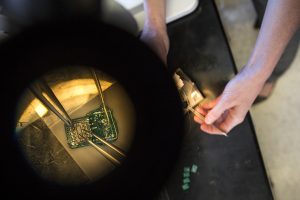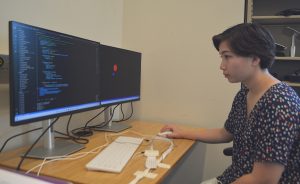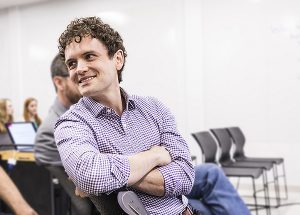By Wayne Gillam | UW ECE News

A look through a microscope at circuitry being developed in the lab of UW ECE Professor Chet Moritz, who is co-director of the Center for Neurotechnology. UW ECE has partnered with the Center’s Research Experience for Undergraduates summer program for over a decade, hosting outstanding students from across the country in UW ECE labs. Photo by Mark Stone / Center for Neurotechnology
This summer, UW ECE labs are hosting five outstanding undergraduate students from across the country who are learning about neurotechnology through immersive research experiences, interactive courses and workshops. The students are part of a larger cohort placed at labs across the UW campus to take part in the Research Experience for Undergraduates through the Center for Neurotechnology. This 10-week summer program is funded by the National Science Foundation and facilitated by the Center, which is co-directed by UW ECE faculty members Rajesh Rao and Chet Moritz.
“UW ECE has a rich history of partnering with the Center for Neurotechnology to mentor students from around the country each summer for the last 11 years,” said Moritz, who is a C.J. and Elizabeth Hwang Professor at UW ECE. “ECE faculty and graduate students provide outstanding hands-on research experience to these diverse students. Many students in the REU program have gone on to Ph.D. graduate programs here at the UW and at other top schools around the country.”
The REU program provides exceptional students with opportunities to work in the labs of scientists and engineers who are internationally recognized in their respective fields. This year, the program has 10 participants, who were selected from over 180 students that applied. At UW ECE, students have been placed in Moritz’ lab and with UW ECE faculty members Sam Burden, Jeffrey Herron, Amy Orsborn and Azadeh Yazdan, who are all Center affiliates well known for their work in neural engineering. REU participants are assigned research projects to complete over the summer with guidance and mentoring by faculty and graduate students in the lab.
In addition to working in research labs, students take part in scientific communication classes and attend workshops focused on industry applications and neuroethics, which is the study of ethical issues involved in neurotechnology. This training, along with the lab research experience, is designed to provide the students with a solid foundation for graduate study, one that can introduce them to new academic and career paths and provide a glimpse of the road ahead.
“I’ve never been exposed to engineering research beyond the undergraduate level,” said Annika Pfister, an REU participant in Burden’s lab who is a rising senior at Wellesley College in Massachusetts. “This program allowed me to get to know grad students and really get a feel for what grad school might be like, and that solidified my decision about what career I’d like to pursue. Broadly speaking, I’d like to stay in academia and potentially end up becoming an engineering professor doing research in a university setting.
Research in the lab

Annika Pfister, an REU participant who is a rising senior at Wellesley College in Massachusetts, is participating in research this summer in the lab of UW ECE Assistant Professor Sam Burden. Photo by Eric Chudler / Center for Neurotechnology
Pfister said she was thrilled to learn upon acceptance into the program that she would be placed in Burden’s lab. Burden is a UW ECE associate professor and the Department’s associate chair for diversity, equity and inclusion. He is also co-director of the AMP Lab at the UW, which seeks to ‘amplify’ human and robotic movement and performance in the interest of designing treatment strategies and assistive technologies that can improve people’s lives. His work focuses on applications in robotics, neural engineering and human-cyber-physical systems.
“Annika is an outstanding researcher who has excelled in the lab, bringing curiosity, creativity and brilliance to experiments with human subjects. She participates fully in the intellectual and social community in my group and in the REU program,” Burden said. “Back at Wellesley, Annika is studying neuroscience, but this liberal arts college doesn’t have an engineering program. The REU program gives fantastic students like Annika access to research opportunities that are unavailable in their undergraduate institutions. I am confident this summer experience will open doors for her in graduate school and beyond.
In Burden’s lab, Pfister was mentored by UW ECE graduate students Maneeshika Madduri and Amber Chou. Pfister was assigned her own research project, which was a subset of experimental work being conducted by Madduri. Pfister’s role in the course of several experiments conducted with research subjects was to monitor and adjust a decoding device that reads electromyographic (electrical muscle) signals from the surface of the skin. This device translates these signals into visual outputs on a screen, enabling the user to control a cursor with their forearm muscles while attempting to follow a visual target on screen.

UW ECE Associate Professor and Associate Chair for Diversity, Equity and Inclusion Sam Burden. Burden’s research work focuses on applications in robotics, neural engineering and human-cyber-physical systems. Photo by Mark Stone / University of Washington
“My part of this project is involved with an aspect of the decoder called the ‘adaptation rate,’” Pfister said. “Previously, it was set to a fixed number. My goal this summer is to figure out whether having the adaptation rate be dynamic and change over the course of the experiment helps with overall task performance and user learning.”
Pfister will present her findings, along with other participants in the REU program, at the CNT Summer Undergraduate Research Symposium, which will be held August 17 in the Bill & Melinda Gates Center for Computer Science & Engineering.
“The CNT Summer Undergraduate Research Symposium provides REU students with the opportunity to showcase their work to the local neuroscience and neural engineering research communities,” said Eric Chudler, who is the Center’s executive and education director and principal investigator of the REU program grant. “These talks and poster presentations help prepare the students for their attendance at future scientific meetings and conventions.”
A pathway to graduate school
By participating in this program and mentoring students who have shown a keen interest in neurotechnology, UW ECE and its CNT-affiliated faculty and graduate students are helping to prepare the next generation of neural engineers. And according to Chudler, it’s not uncommon for these students to later return to the UW or its affiliated institutions as graduate students pursuing careers in neurotechnology.
For Pfister, she said that she found this research experience enjoyable and useful for forming her future academic and career goals. And the mentorship she received at UW ECE through the REU program appears to have made a lasting impact.
“My research experience this summer has been invaluable to getting a feel for how day-to-day research would work,” Pfister said. “In terms of the program, it has been really great for me, helping me to think about how I want to engage with the scientific community going forward. If I am at grad school, whether it is at conferences or in presentations, I’ll be thinking about how to best present my work. I’ll also be thinking critically about what impacts my work is going to have, making sure that it’s going to be useful and able to help people.”
For more information about the Research Experience for Undergraduates program, visit the Center for Neurotechnology website.

